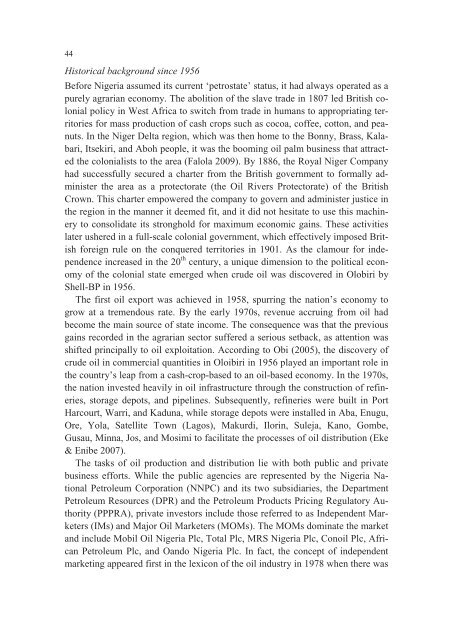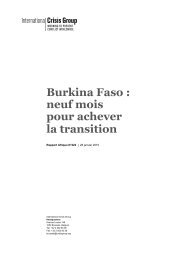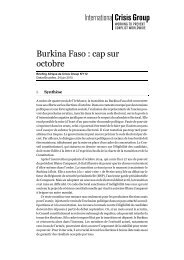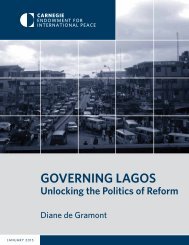Violence in Nigeria
ASC-075287668-3743-01
ASC-075287668-3743-01
Create successful ePaper yourself
Turn your PDF publications into a flip-book with our unique Google optimized e-Paper software.
44<br />
Historical background s<strong>in</strong>ce 1956<br />
Before <strong>Nigeria</strong> assumed its current ‘petrostate’ status, it had always operated as a<br />
purely agrarian economy. The abolition of the slave trade <strong>in</strong> 1807 led British colonial<br />
policy <strong>in</strong> West Africa to switch from trade <strong>in</strong> humans to appropriat<strong>in</strong>g territories<br />
for mass production of cash crops such as cocoa, coffee, cotton, and peanuts.<br />
In the Niger Delta region, which was then home to the Bonny, Brass, Kalabari,<br />
Itsekiri, and Aboh people, it was the boom<strong>in</strong>g oil palm bus<strong>in</strong>ess that attracted<br />
the colonialists to the area (Falola 2009). By 1886, the Royal Niger Company<br />
had successfully secured a charter from the British government to formally adm<strong>in</strong>ister<br />
the area as a protectorate (the Oil Rivers Protectorate) of the British<br />
Crown. This charter empowered the company to govern and adm<strong>in</strong>ister justice <strong>in</strong><br />
the region <strong>in</strong> the manner it deemed fit, and it did not hesitate to use this mach<strong>in</strong>ery<br />
to consolidate its stronghold for maximum economic ga<strong>in</strong>s. These activities<br />
later ushered <strong>in</strong> a full-scale colonial government, which effectively imposed British<br />
foreign rule on the conquered territories <strong>in</strong> 1901. As the clamour for <strong>in</strong>dependence<br />
<strong>in</strong>creased <strong>in</strong> the 20 th century, a unique dimension to the political economy<br />
of the colonial state emerged when crude oil was discovered <strong>in</strong> Olobiri by<br />
Shell-BP <strong>in</strong> 1956.<br />
The first oil export was achieved <strong>in</strong> 1958, spurr<strong>in</strong>g the nation’s economy to<br />
grow at a tremendous rate. By the early 1970s, revenue accru<strong>in</strong>g from oil had<br />
become the ma<strong>in</strong> source of state <strong>in</strong>come. The consequence was that the previous<br />
ga<strong>in</strong>s recorded <strong>in</strong> the agrarian sector suffered a serious setback, as attention was<br />
shifted pr<strong>in</strong>cipally to oil exploitation. Accord<strong>in</strong>g to Obi (2005), the discovery of<br />
crude oil <strong>in</strong> commercial quantities <strong>in</strong> Oloibiri <strong>in</strong> 1956 played an important role <strong>in</strong><br />
the country’s leap from a cash-crop-based to an oil-based economy. In the 1970s,<br />
the nation <strong>in</strong>vested heavily <strong>in</strong> oil <strong>in</strong>frastructure through the construction of ref<strong>in</strong>eries,<br />
storage depots, and pipel<strong>in</strong>es. Subsequently, ref<strong>in</strong>eries were built <strong>in</strong> Port<br />
Harcourt, Warri, and Kaduna, while storage depots were <strong>in</strong>stalled <strong>in</strong> Aba, Enugu,<br />
Ore, Yola, Satellite Town (Lagos), Makurdi, Ilor<strong>in</strong>, Suleja, Kano, Gombe,<br />
Gusau, M<strong>in</strong>na, Jos, and Mosimi to facilitate the processes of oil distribution (Eke<br />
& Enibe 2007).<br />
The tasks of oil production and distribution lie with both public and private<br />
bus<strong>in</strong>ess efforts. While the public agencies are represented by the <strong>Nigeria</strong> National<br />
Petroleum Corporation (NNPC) and its two subsidiaries, the Department<br />
Petroleum Resources (DPR) and the Petroleum Products Pric<strong>in</strong>g Regulatory Authority<br />
(PPPRA), private <strong>in</strong>vestors <strong>in</strong>clude those referred to as Independent Marketers<br />
(IMs) and Major Oil Marketers (MOMs). The MOMs dom<strong>in</strong>ate the market<br />
and <strong>in</strong>clude Mobil Oil <strong>Nigeria</strong> Plc, Total Plc, MRS <strong>Nigeria</strong> Plc, Conoil Plc, African<br />
Petroleum Plc, and Oando <strong>Nigeria</strong> Plc. In fact, the concept of <strong>in</strong>dependent<br />
market<strong>in</strong>g appeared first <strong>in</strong> the lexicon of the oil <strong>in</strong>dustry <strong>in</strong> 1978 when there was






